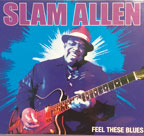 Slam
Allen
Slam
Allen
Feel These Blues
American Showcase Music
The first word that comes to mind listening to Slam Allen is energy. This
is a man who obviously flat out loves what he’s doing. He celebrates
the blues and bluesy old soul in everything he does. He came up in the
Catskill region of New York, the son of a multi-instrumentalist father
who was also a DJ. He turned Slam on to the masters – BB, Freddie
and Albert King and Albert Collins. But he also instilled in his son a
love of the master soul men, too. Otis Redding is all over Baby Please
Don’t You Go, for instance, and 35 Miles Outside of Memphis suggests
Edwin Starr in the title. On the Blues Is Back he plays his best B.B.
King and Albert Collins licks. He is, like most players, a combination
of influences and imagination. Slam spent the best part of a decade fronting
the James Cotton band – kinda like getting a master’s degree
in the blues. He is blessed with a fine voice, emotive and joyful, and
is a first-rate guitarist. Backed by a hot band – John Ginty on
B3 and other keyboards, Jeff Anderson on bass guitar, and Dan Fadel at
the drums – Allen and the fellas don’t fail to impress. All
original material, outside of an interesting cover of Prince’s Purple
Rain, Allen proves himself a fine songwriter, as well. On the B.B. King-inspired
You’re Wrong he complains about his ex-amore suing him for child
support, “when we don’t even have any kids.” B.B. King’s
influence is conspicuous throughout. On All Because of You, he sings “People
say I’m crazy/it must be true/they don’t know that/ it’s
all because of you.” The songs are not really the focal point. It’s
the delivery; his voice and that buttery clean guitar that make the case
for Slam Allen being a blues man to keep an ear on. Very nice, indeed.—
Mark E. Gallo
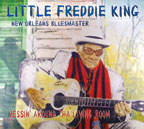 Little
Freddie King
Little
Freddie King
Messin’ Around Tha Living Room
Made Wright Records
Not exactly Little Freddie’s living room, this rambunctious affair
was cut at the Living Room, a 1930s church cum studio in Algiers, La.
Still, it has that comfort and familiarity of a group of friends kickin’
it at home. At 74, Little Freddie has been playing the blues most of his
life. He’s got it nailed down pretty solid. He is, you’ll
pardon that overused phrase, old school. The inner jewel case proclaims:
THE WORLD RENOWNED, HARD TO KILL, PISTOL PACKING, CHICKEN PICKIN, STRING
PULLING, SHOW STOPPIN’, FREIGHT TRAIN HOPPIN’,
GAME COCK WALKIN’, MASTER OF ELECTRICITY, KING OF THE
GUT-BUCKET BLUES, CONNOISSEUR OF WOMENS, HIS ROYAL HIGHNESS —-
LITTLE FREDDIE KING. Born Fread Martin in Mississippi In 1940, Freddie
has been a torch-bearer of stripped down, minimalistic blues, since. This
12th album is more of that same signature sound. Joined by his long-time
sidekick, drummer and producer “Wacko” Wade, alongside guitarist
Vasti Jackson and slide player Luke Winslow King, bassist William Jordan,
and harper Bobby Lewis di Tullio, Jr. the groove here is a musical conversation
between old friends.
The opener, Bad Bad Julie sets the tone. As lyrically minimal as it is
musically it showcases Freddie’s vocals and the band’s propensity
for a good jam. The instrumentals, Old Yellow Boy and Brother Hay Shaker
are stretched-out jams, almost jazzy in their scope. The harmonica on
the classic Soul Serenade, is a major delight, as well. Back At The Bucket
of Blood, with its hard rim and snare backdrop and sweet guitar lines,
tells the story of Little Freddie’s comin’ up. Hey Tom I Saw
You addresses that no account Tom and what he was doing with “my
old lady in the car.” Tom “thought I didn’t know.”
This all done to a lazy groove with that gorgeous harp. The standout tune
is easily the highly infectious Do Da Duck Quack Quack. A toe tapping
repetitive rhythm. Little Freddie announces “we are gonna do the
duck/quack quack…” That groove is just killer. Kinda like
this album. Little Freddie King may not be the man you expect. This one
might just catch you off guard. —Mark E. Gallo
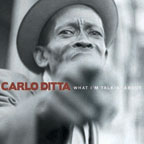 Carlo
Ditta
Carlo
Ditta
What I’m Talking About
Orleans Records
Carlo Ditta is a hipster poet from New Orleans. He’s also a record
producer and owner of Orleans Records. He’s also an archivist who
helps keep careers going for the likes of Danny and Blue Lu Barker, Little
Freddie King, Mighty Sam McCLain, Coco Robicheaux, CP Love, Guitar Slim,
Jr. and others. He’s also a singer-songwriter. He also performs
regularly with poet-performer John Sinclair when Sinclair performs in
New Orleans. Ditta has more hats than a tree full of monkeys. On this
second full length album, following 2010’s Try A Little Love, Ditta
explores the many nuances of life and love. The opening title track is
an extended pick-up line complete with Steve Allen’s flute and baritone.
This is talkin’ stuff brought to a new level. It isn’t politically
correct and it’s more fun than skinny dipping. This segues directly
into Go On Fool (“don’t you roll those eyes/love is a fool
all the way until you die”), with an ultra-hip trumpet from Charlie
Miller. As The World Turns is an antiwar piece buoyed by David Rebeck’s
accordion and Ditta’s guitar. He sings/recites “Some men they
fight for religion/some men they fight for their women/and some people
they die for their country/and some of them die because they’re
hungry/and all war is bad for peace/all wars never seem to decease/and
they say this is all good for our economy.”
Beating Like a Tom Tom sounds like and reads like a Tom Waits with Andrew
Bernard’s subtle farfisa supporting the monologue. Pretty Acres
is an ode to Louis Prima and second line dancing in the streets. Great
tenor from Steve Allen and fine guitar from Vic Larocca. His take on Aaron
Neville’s classic Tell It Like It Is approaches the tune from a
new, less musical angle. Try A Little Love features vocals in the right
track and Larocca’s slide guitar in the left. (“We could go
by the ocean or the Gulf of Mexico/we could go by the ocean and talk about
love/I got a problem/got to do with you/but I’ll give in/it’s
the right thing to do”).
I’m Leaving You is a straight up leaving song (“My bags they’re
all packed/I’d like to say I’ll be back/but that’s not
true/I made my mind up all the way/and though it tears me up to say/ I’m
leaving you”). This could have been a re-worked Sinatra ala One
More For The Road.
On Walk That Walk, opening with rattle snake percussion and cymbals, courtesy
Anthony Donado, Carlo plays and recites “I want you to listen to
me right now/go on walk that walk and talk that talk/you looking good
baby/do that strut…” more of that stuff talkin’ set
to a groovy back drop of guitar and baritone from Bernardo. The final
tune, a re-work of Many Rivers To Cross, is a glimpse into the artist’s
vision. Carlo Ditta is an artist. This is a work of sometimes ferociously
powerful art. —Mark E. Gallo
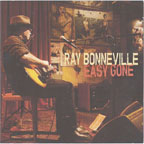 Ray
Bonneville
Ray
Bonneville
Easy Gone
Red House 2014
Peripatetic bluesman Ray Bonneville has accrued seemingly far more than
the average lifetime of experience. His resume includes residences in
Boston, New Orleans, Paris, Boulder, and currently Austin; stints as a
Marine and a commercial pilot; and, oh, yes, a multi-decade career as
a singer-songwriter, including garnering such accolades as a 1999 Canadian
Juno award for album of the year; the International Folk Alliance 2009
award for Song of the Year; and a win in the Solo/Duo category at the
2012 International Blues Challenge.
On his fourth release for the folk/roots/blues label Red House, Bonneville
cements his credentials as one of the most compelling contemporary composers
and performers. The brevity of the album - ten songs, 38 minutes - is
redeemed by the high quality throughout, both of musicianship and composition.
Nine of the songs are penned by Bonneville, the exception being a tasty
rendition of the Hank Williams classic, “I’m So Lonesome I
Could Cry.”
That tune is perfect for Bonneville’s forte, which is finely crafted
songs with an ethereal, mournful, evocative mood. In this CD’s trio
format, he is accompanied expertly and unobtrusively by bassist Gurf Morlix
(a great name for a science fiction character) and drummer Geoff Arsenault.
(Will Sexton on bass and Rick Richards on drums replace the former on
two numbers, with Richie Lawrence adding piano.) Bonneville provides the
front guitar work, skilled but unpretentious, allowing proper focus on
the songs themselves; his understated harmonica contributions are likewise
spare but exemplary.
By the way, there’s some terrific poetry here. Bonneville writes
abstruse lyrics - think Bob Dylan - that evade explicit meaning yet strike
an undeniable chord of insight and observation:
“fast as a child grows days are long
time only knows before it’s gone….”
“riding a line thin as a razor between eternities….”
It’s tough to choose my favorites on this CD, since they’re
all good; let’s just cite the opener, “Who Do Call the Shots,”
with a spooky Nawlins vibe; “Shake Off My Blues,” which has
a tinge of 1950s R&B flavor; and “South Little One,” which
displays Bonneville’s moving, smoky vocal tenor at its best. Another
fine outing.— Steve Daniels
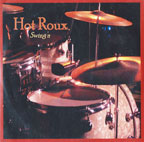 Hot
Roux
Hot
Roux
Stranger’s Blues
Self-produced 2015
It’s time to welcome a formidable new band to the blues and roots
Americana musical world. Hot Roux hails from San Buenaventura (commonly
known as Ventura), CA, and for the last several years has been the house
band for weekly Friday night gigs put on there by Hi Hat Entertainment.
In addition, the trio has provided band support for the Santa Barbara
Blues Society in its presentations of such famed blues performers as Kenny
Neal, Kim Wilson, James Harman, and Albert Lee.
For its debut album, the band meets the expectations of its moniker: a
roux is a tasty sauce made of flour and butter, and “Swing ‘n”
serves up a tangy smorgasbord of ten lively tunes ranging from straight
blues to rockabilly to one with a Latino/Cajun flavor. The core trio is
represented by guitarist Ed Berghoff, bassist Brent Harding, and drummer
and vocalist Jerry McWorter. Harding and McWorter penned all of the compositions.
Harding is spelled on a couple of tracks by Steve Nelson, and Berghoff’s
chores are handled on multiple tunes by talented guitarists Franck Goldwasser
(“Paris Slim” on several of his own releases and collaborations)
and Tommy Harkenrider, frequent main axe man these days for James Harman.
This CD venture opens with “Broken Again,” a mid-tempo rockabilly
number showcasing Berghoff’s slick guitar work and McWorter’s
smooth tenor. “Stranger’s Blues” gives Goldwasser room
to deploy some reverb mixed with skittering single notes in a 12-bar format,
and it’s followed by “Woman Where You Been,” an uptempo
blues featuring Harkenrider’s snazzy guitar work. (Some of his riffs
bring to mind the late, great Hollywood Fats: high praise.) Guest Jacob
Huffman chimes in with some neat harmonica work.
“Seven Lonely Nights” is given two treatments, the first a
mid-tempo shuffle and the second a speedier, jazzed-up version; in the
former, Goldwasser proves that he can play a mean slide guitar. “Tick
Tock” is introduced by a compelling solo by Harkenrider, and augmented
by some fine sax courtesy of guest Bill Flores. “Anna Lee”
suggests a revisit of the tune made famous by Elmore James, but instead
is a new opus with another notable Harkenrider contribution and a country
nuance. “Red Pepper Baby” brings Harding prominently into
the mix, with Goldwasser providing both lead and overdubbed rhythm guitar.
“Can’t Get You Off My Mind” gives guests Pat McClure
on guitar and Sam Bolle on bass their chance to shine.—Steve Daniels
 Joel
Mabus
Joel
Mabus
Bird in This World
Fossil Records 2015
Scion of a family of country musicians, singer and string multi-instrumentalist
Joel Mabus has combined his early exposure to “hillbilly”
music with his love for the rural blues styles of recording artists to
whom he listened in his teen years, notably including Brownie McGhee,
Lightnin’ Hopkins, and Mississippi John Hurt. Although lacking mainstream
notoriety, Mabus has parlayed his influences and talent into a long and
apparently successful career as performer, teacher, and recording artist.
This album is my introduction to his music, and I’m impressed.
Comprised of ten original tunes, the CD features Mabus solo, singing and
playing his guitar, and the ambience is laid-back yet simultaneously witty,
whimsical, and wise. Mabus has a warm, friendly tenor voice and a folksy
presentation; it feels like he’s your grandpa, rocking on the back
porch on a warm summer evening. While making you chuckle and imparting
some subtle life lessons, simultaneously he’s demonstrating an unpretentious
but adept facility on his acoustic axe.
As Mabus’s liner notes state, “some might want to call this
the ‘blue side of folk’ or the ‘country side of blues’…but
it’s blues to me.” To me, also. Generously and thoughtfully,
Mabus provides not only lyric sheets, but a summary of which tunes are
principally dark, humorous, philosophical, or historical. Every song has
something special, many of them both poignant and wry; dry wit is rampant
here.
When is the last time you have heard a song about “Hemingway’s
Beard”?
Highlights: “Hillbilly Singer,” wherein the narrator queries
his favorite touring performer, “still good but showing his age,”
about why he keeps on touring and playing. The extended answer is revelatory
and moving, and obvious only in retrospect. “How About the Blues”
is a fine tribute to the history of the genre, and “Simply Lost
in the Blues” reveals Mabus’s talent for lyrics, perhaps his
greatest strength:
“Yeah, like a bug - on the breeze
Or a kite - in the trees
I fly whichever way the weather may choose
Not for me to decide,
Just along for the ride
Simply lost in the blues”
You won’t dance to this album, but you’ll laugh with it, think
about it, and nod your head in rueful agreement.— Steve Daniels
 Gaye
Adegbalola & The Wild Rutz
Gaye
Adegbalola & The Wild Rutz
Is It Still Good to Ya?
Hot Toddy Music 2014
The demise in 2009 of Saffire- The Uppity Blues Women, a dynamic women’s
blues trio, left a lacuna in contemporary blues. Now founder and Blues
Music Award winner Gaye Adegbalola has teamed with three other creative
singers and musicians in a new ensemble. The group is comprised of Gaye,
Tanyah Dadze, Gloria Jackson, and Marta Fuentes. This eclectic selection
of fourteen songs, all penned by Ms. Gaye, represents their first recorded
foray, and it’s a winner.
Gaye wrote all the tunes, and they reflect her witty and perspicacious
view of life. As the group opines in the liner notes, they eschew the
“world of screaming electrified instrumental acrobatics and digital
perfectionism” and instead hew to a pleasing mix of a cappella or
minimally instrumented numbers. Multiple percussion tools are deployed
(including spoons, soft shake, and…plastic tubes?), periodically
augmented by acoustic guitar. Thus emphasis is inevitably on the melding
of four mellifluous voices, and the resultant harmony is uniformly spot-on
and often sublime.
Several of the songs display the sultry wit and self-assertion for which
Saffire was notable. The opening title track evokes memories of Saffire’s
“Silver Beaver” and “Middle Aged Blues Boogie,”
among others. “The Dog Was Here First” is hilarious, yet has
an undertone of forlorn love. “Sick Leave Blues” evokes the
heartache of psychic distress, and “Eye Candy” and “Coffee
Flavored Kisses” are more overtly romantic.
Veering into topicality, “The Skittles Blues” scathingly limns
the far too frequent - arguably systemic - devaluation of the lives of
young black men, and “You Don’t Have to Take It” encourages
rejection of and resistance to domestic violence. “Let Go, Let God”
is a beautiful spiritual equal to the works of The Blind Boys of Alabama
and Sweet Honey in the Rocks. Finally, “Boy in the Boat” fulfills
Gaye’s insistence in the liner notes that an a cappella group must
have a doo wop song, and each CD at least one sexy song.
Also, kudos for those liner notes: in addition to full lyrics, there is
information about the genesis and content of each song, and biographies,
thank-you’s, and credits. This album furnishes a primer on what
liner notes should be.— Steve Daniels
 Generation
Blues Experience
Generation
Blues Experience
Private Angel
R Music, Inc. 2014
Young guitar phenom Ray Goren stands at the far left in the photo of the
septet that graces the CD, and he’s the only one not smiling. When
you’re fourteen years old, maybe you have to concentrate seriously
to play the blues…especially when you have teamed with a sexagenarian
and a septuagenarian.
Los Angeles bluesmen Jamie Powell and Sammy Lee, respectively 78 and 68
years old at the time of this recording, met teenager Ray Goren a couple
of years ago, and a mutual admiration society formed. For this album the
trio recruited Lester Lands to play bass, Albert Trepagnier, Jr. on drums,
and Tadg Galleran on keyboards, supplemented by arranger and sax man Robert
Spencer and an occasional other sideman. The resultant eight tunes were
penned by the group, with the exception of “Ain’t No Sunshine,”
the famed Bill Withers tune.
The CD opens with “Little Mama,” a mid-tempo rocker introduced
with swinging horns and featuring some fine tinkly piano, and potent singing
by Lee. Goren fits in an adequate solo, and assumes vocal duty on the
ensuing title track, a slow burner in which he utilizes the entire guitar
fretboard, deploying single notes, arpeggios, and wah wah effects with
lots of brio but varying success. Next up is the Goren composition “Crazy,”
another slow number that affords Jamie Powell the opportunity to exercise
his impressive pipes, segueing from a talking-blues style to some tasty
shouting and wailing. Meanwhile, Goren demonstrates technical wizardry
in a long solo probably evoking appreciative nods from Jimi Hendrix and
Roy Buchanan in their graves.
“Rainin’ “ is another Goren tune with a 1950s vibe,
complete with horns and back-up vocals. Sammy Lee then makes a vocal return
on “Katrina” and “Sugar Momma,” the former displaying
Goren’s guitar virtuosity in its more restrained mode, the latter
a true blues shuffle allowing Lee to do some excellent harmonica work.
Lester Lands then steps up and connects with “Put Love on Your Guest
List,” a soul number with some great gospel shouting and tasteful
Goren guitar. The album concludes with a long eight minute cover of the
Withers classic. Matching the original simply isn’t feasible, but
the band does a creditable job, with Goren handling the vocal in his slightly
thin tenor and unleashing an extended, blistering guitar solo ending in
several bars of pensive single note beauty.
Lee, Powell, and Lands are compelling singers; the band is tight; the
songs are quality; and Goren has the required dazzle if not yet the soulful
depth.— Steve Daniels
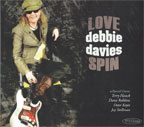 Debbie
Davies
Debbie
Davies
Love Spin
Little Dipper Records/Vizztone 2015
Scion of a musical family, Debbie Davies has received well deserved accolades
for over three decades as one of the best blues guitarists (without the
condescending “female” modifier) around. Since serving a stint
with Albert Collins’ band in the 1980s, she has produced many fine
albums, won Blues Music Awards as both Traditional and Contemporary Female
Blues Artist of the Year, and collaborated with many other blues luminaries.
Her new release is another winner.
Hitting the studio with a sturdy backing of Don Castagno on drums, Paul
Opalach on keyboards, bass, and lap steel, and Wilbo Wright alternating
with Scott Spray on bass, this combo sounds solid together. Adding spice
are guests Terry Hanck and Dana Robbins on saxophone, Dave Keyes on piano,
and Jay Stollman on one vocal track. The eleven tunes include four by
Davies and five by Castagno. There is a piquant variety to the songs,
which range from funky dance to R&B to slow blues to gutbucket juke
joint.
The opening cut, “Life of the Party,” features a zesty guitar
intro that immediately reaffirms Davies’s command of the instrument.
The ensuing title cut, a mid-tempo rocker, delivers nice interplay between
Davies and Opalach’s lap steel.
“Let the Heartaches Begin” is a 1950s-style soul blues about
a break-up, distinguished by Hanck’s sax contribution and his vocal
duet with Davies. Stollman’s duet with her on “Don’t
Change It Up” likewise shines, as does the easy-paced shuffle “It’s
All Blues.”
In “Talk Real Slow,” Davies deploys wah-wah effects. “I’m
Not Cheatin’ Yet” is a swinger bolstered by both Robbins and
Keyes, and its humor carries over into “Two Twenty-Five Year Olds.”
The mood shifts abruptly with “A Darker Side of Me,” penned
by Swedish bluesman Sven Zetterberg but appropriate to Davies’s
confessed history of conquering substance abuse. Similarly, “I Get
the Blues So Easy” encompasses some of the travails of a traveling
musician. The album closes with the irresistible “Way Back Home,”
highlighting Davies’s gritty guitar work.
That guitar work is the forte of the album. The songs are uniformly good,
Davies’s singing is spot-on, but her reliable and tasteful six-string
talent is the high point. Eschewing pretentious display, she plays virtuoso
licks without compromising the integrity of the songs. I like this album
a lot.— Steve Daniels
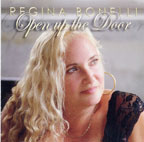 Regina
Bonelli
Regina
Bonelli
Open Up The Door
www.reginabonelli.com
A few issues ago Big City Rhythm & Blues columnist Dave Fields wrote,
“I’ve been waiting for the next Blues babe from the NY area
to emerge and Regina Bonelli has broken loose.” With that advice
I looked online and couldn’t wait to hear her full CD “Open
Up The Door” and I was not disappointed. Miss Bonelli has a knock
out voice, looks, presence and songs while her band of fellow New Yorkers
who’ve been playing a weekly gig in a Brooklyn club with her include
renowned bluesman Michael Hill as producer and guitarist, Kevin Hill,
Mike Griot or Pete Cummings on bass, David A. Barnes on harmonica and
Chicago transplant William McClellan Jr. playing drums. The all original
song set list are autobiographical, each leading into the next, a very
ambitious tactic for a debut CD but blues is real life and this is the
life Regina has led.
Regina’s piano leading into her throaty opening invitation of “Open
Up The Door” and walk right into her world. Her upbringing notes
that “Mama Raised A Sweet Thing” but she didn’t raise
no fool, then takes a more belligerent tone to “Daddy I’m
A Big Girl Now.” I thought the title “Cybersex Blues”
was trying to be trendy but the infectious quality of slide guitar, horns
and harp bookending Bonelli’s alluring, swinging warble that really
pulled me into her digital fold before switching to the more spiritual
“Mystical Love.” “I Fell” hits hard with some
tender chords then bursting into a blaze of passion till “Single
Mother Single Live” brings it back down to earth. A sweet shuffle
asks the question “Can You Fill His Shoes” then shifts to
the forlorn soul searching of are you “Usin’” me?
An acoustic guitar and tambourine drive the final number, as Michael Hill
steps to the mic for a duet of lovers who argue that ‘you knew we’d
have problems from the start’ but each time they make love it feels
like “The Very First Day.”
Regina Bonelli is a woman who appears to have everything going for her,
the sound, the songs, the band, the looks and she’s living life
on her own terms so “Open Up The Door” ’cause Regina
Bonelli’s ready to break loose.—Roger & Margaret White
bluestime@sbcglobal.net
 Randy
Volin and The Hard Ones
Randy
Volin and The Hard Ones
Detroit Thang 2015
In Your Pants Music www.randyvolin.com
www.facebook.com/
RandyVolinandTheHardOnes
Multicoastal bluesman Randy Volin hasn’t forsaken his warm California
sun but he is revisiting his third coast hometown with his latest disc
“Detroit Thang 2015.” Recorded on both mid and west coasts
all songs were written by Randy Volin except one. Volin also provides
vocals, guitars, fender bass and Hammond B3 while The Hard Ones are all
guest criminals grabbing what spots they can in this hard case line up.
The beat is laid down by Vinnie Dombrowski, David Salinas, Todd Glass
or Steve Kohn, bass by Steve Nelson or Tad Wadhams with keyboards by Chris
Codish, Phil Parlipiano or George Canterbury, and the Horny Hard Ons AKA
the Regular Boys horn section are also part of this alliance. The rest
of the conspirators, the background singers, hand clappers and fluffers
are known simply as the Hard Ons, nobody’s taking any other credit
and these guys ain’t snitches.
The whole thang leaps into action with “When She Says Jump”
a swagging horn romp with guitar hopping in then “Come Back Home”
has Randy channeling Elmore with an under layer of “She’s
About A Mover.” The hard tone, swaggering vocals and thrusting horns
of “Mr. Johnson” may be about his own Johnson. A down river
urban delta blues of Dobro sliding up against a West Coast beat of “Brand
New Day” goes into an autobiographical stream of conscience rap
vowing “It’s Gonna Be Alright” with an acoustic guitar
under crashing electric chords. A Bo Diddley beat flavors Randy’s
growling acclamations of “I Want Your Lovin’” ’cause
“She’s Fine” fine, fine, finds the guitar working against
cooing background vocals and “Two Worlds Collide” blazing
guitar shines through a calm yet barely restrained vocal. Two instrumentals
fill out this set, a breezy Cali cruise down that infamous “Mulholland
Drive” and an old school AM radio guitar strangling instrumental
with an eerie incantation of “Mofocito” its only lyric. The
only cover, “Route 66,” is used as a travelogue for Volin’s
California trip though written well before he was born running closer
to Chuck Berry than Nat King Cole.
Yeah its true what they say, you can take the musician out of Detroit,
but you just can’t take the music out of the Detroiter, it’s
a “Detroit Thang.” —Roger & Margaret White bluestime@sbcglobal.net
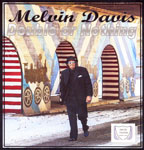 Melvin
Davis
Melvin
Davis
Double Or Nothin
Rock Mill Records
Cdbaby.com www.facebook.com/DetroitSoul
Ambassador
Motor City Soul Ambassador, gold record selling singer/songwriter/drummer
and bandleader Melvin Davis is back on the scene with his first new music
in forty years “Double Or Nothing.” Returning to music in
his mid sixties, burning up the stage he’s now taken his live band,
given them the sweet sheen of classic Motown, which is no surprise considering
the makeup of this Detroit band. McKinley Jackson whose day job is music
director for the Four Tops and wrote charts for all Marvin Gaye’s
hits including “What’s Going On,” is the keyboard player
while backup vocals are by Pat and Diane Lewis who in the heyday of soul
music were Isaac Hayes’ Hot Buttered Soul. This is a true a super
group of unsung heroes backed by Matt Thibodeau on guitar, Dave Uricek
bass, Todd Boshma drums, Drew Schultz percussion with Jimmy Smith, Bobby
Streng, Matt Martinez and Keith Kaminski on horns. Together they’ve
nailed the sound and captured the feel of old school Motown Soul with
a message of love and understanding that is just as relevant today.
The title cut “Double Or Nothing” was originally written and
recorded in 1976 but here the liquid glide of guitar under a sweet soul
choir and horns drive Melvin’s vocals to soar as the years seem
to melt away. These phantoms of Funk hit the groove with “Power
Glory Fortune Fame” the same old promises the music biz has dangled
in front of musicians from someone who has lived this tale for more then
50 years and replies with “Somethang’s (I Just Don’t
Do).” With that they also have the crowd participation boogie “W.C.T.P.”
(We Come To Party)” and the funky positivity of “Why Can’t
We Communicate,” first done in the’70’s with his hard
rockin’ soul band Radiation, still remains unanswered. As an elder
sage of Soul, Davis has always put forth a message of positivity and “Cherish
Each Moment” says “Time is a candle that burns, Time will
never return,” but Melvin’s voice reaches for the heights
remembering and “Thinking Of You” while playing for right
here, right now.
Melvin Davis’ may be restarting his recording career at 70 but “Double
Or Nothing” has a sticker “Warning: Contents contain extensive
truth, positive messages and addictive grooves that may become habit forming.”
You’ve been warned!—Roger & Margaret White bluestime@sbcglobal.net
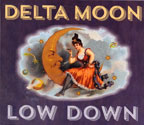 Delta
Moon
Delta
Moon
Low Down
Jumping Jack Records
www.deltamoon.com
The band Delta Moon may not seem unusual with its two guitars, bass and
drums line up but when Tom Gray and Mark Johnson both break out the lap
steels they take this Southern roots band into a groove and you realize
this is not your average blues band. Behind the scream of steel, singer/main
songwriter Tom Gray’s whiskey soaked refrains add to this atmosphere
while Marion Patton’s drums and Franher Joseph’s bass and
backing vocals give Delta Moon further depth. With their tenth recording
“Low Down,” Delta Moon stays true to its path-less-traveled
while plowing ahead into fresh territory.
Of the dozen “Low Down” tracks, nine are originals with the
“Wrong Side Of Town” driving towards Southern rock till the
slide jumps the tracks while the tribal drums and brassy harmonica break
into some greasy fun on “Open All Night.” The hot sweaty licks
of dual slide guitars fill the “Spark In the Dark” then the
band breaks out with a chugging groove of sad dreams and reflection drifting
into the dark corners of “Afterglow” and vents with the sonic
blasts of a “Mean Streak.” The bouncy trotting pace and the
gospel tinged dueling vocals of Ms Francine Reed drive home the message
of “Nothing You Can Tell A Fool” while the lap steel leads,
southern twang and exuberant shouts because he’s still got his “Jelly
Roll.” The covers on the disc use the familiar sliding steel and
rough figures of Tom Waits’ “Low Down” and the Dylan
cover of “Down In The Flood” but Skip James’ “Hard
Time Killing Floor Blues” uses the finger picked guitar and voice
to define this country blues then the haunting high singing slide is an
organic force that takes on a voice and life of its own.
Delta Moon’s new CD has the contrasts of Southern mellowness with
the tension of hard rock and a hard life that gives their blues a “Low
Down” glow. —Roger & Margaret White bluestime@sbcglobal.net
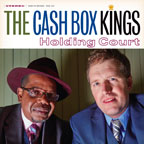 The
Cash Box Kings
The
Cash Box Kings
Holding Court
Blind Pig CD 5165
www.blindpigrecords.com
Tellingly titled after a long-gone weekly magazine that charted jukebox
favorites in the 1940’s and 1950’s, the two Kings—vocalist
and harmonica ace Joe Nosek (think Slim Harpo and Little Walter) and Muddy
Waters-influenced vocalist Oscar Wilson—continue to be the current
torchbearers not only of the classic, electrified sounds of post-war urban
Chicago blues and beyond (New Orleans, ragtime, jump blues and swamp pop)
but the Delta-derived acoustic blues music of the 1920’s and 1930’s
as well. On their third Blind Pig release, the pair are accompanied by
fellow Kings—drummer Kenny “Beedy Eyes” Smith and guitarist/vocalist
Joel Patterson—along with a bevy of honorary Kings including multi-instrumentalist
Billy Flynn, upright bass players Brad Ber and Beau Sample and pianist
Barrelhouse Chuck—on an appealing mix of nifty originals and raw,
totally unvarnished covers. Picks among the latter begin with homage-paying
revivals of sides by two of the Windy City’s blues scene’s
forefathers—Jimmy Rogers’ deep, Delta-scarred epic “Out
On The Road” and John Lee Hooker’s equally bleak tale of the
“Hobo Blues”—and continue through titles by Honey Boy
Allen, Willie Love and, not to be overlooked, Big Smokey Smothers’
boastful “I Ain’t Gonna Be No Monkey Man.” The set’s
eight originals move from the topical (“Download Blues” deals
with digital piracy etc. while “Gotta Move Out To The Suburbs”
describes the grim realities of gentrification) to shades of Dr. John
on “Juju” and cleverly-lyriced gems like “Cash Box Boogie”
and “Sugar Pea” as well as the Ray Sharpe-like rocking country
blues of “I Miss You Miss Ann.” Also noted is Nosek brilliantly
channeling Little Walter on the set-closing instrumental workout “Quarter
To Blue.” Highly recommended.—Gary von Tersch
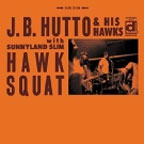 J.B.
Hutto & His Hawks
J.B.
Hutto & His Hawks
Hawk Squat
Delmark CD 617
One of my favorite Chicago blues recordings of all time just got even
better. Similar to the recent updating of Junior Wells’ classic
Southside Blues Jam album from 1967 (with Otis Spann and Buddy Guy), this
refurbished Hawk Squat disc by Elmore James-influenced slide guitarist
J.B. Hutto and various pals (including keyboard whiz Sunnyland Slim) features
six previously unissued tracks (including a nifty, vamping alternate take
on the Bo Diddley-like title song and the lead-off, rambunctiously rowdy
“Speak My Mind” twice) along with a 20-page booklet containing
many never before seen photos, the very informative original 1968 liners
and a new set of entertainingly anecdotal notes from producer and label
owner Bob Koester reminiscing about J.B., the rough-and-tumble Turner’s
Blue Lounge where it all started and the serendipitous manner in which
an AACM free jazz musician, tenor saxist Maurice McIntyre (now known as
Kalaparusha), was added to the record date. Joining J.B. and Slim are
guitarists Lee Jackson (a Cobra recording artist at the time) and, on
one selection, Herman Hassell (in fine form on the catchy minor hit “Hip
Shakin’”) along with bassists Junior Pettis and Dave Myers
and drummer Frank Kirkland while the tracks were laid down, catch as catch
can, over the space of nearly two years at three different locations.
“Hip Shakin’” was recorded off-hours in 1966 at a Chicago
club called Mother Blues with the remainder pretty much divided between
the Sound and Ter-Mar Studios in 1968. Of note is the fact that Sunnyland
Slim plays organ rather than piano on more than a few cuts. Particular
spell-binders, apart from “Hip Shakin’, “Speak My Mind”
and the shoulda-been-a-hit “Hawk Squat”,” from the original
LP comprise the easy rocking, philosophical “What Can You Get Outside
That You Can’t Get At Home” and the grievous tale of a girlfriend
with a “20% Alcohol” habit as well as what sounds like a lost
Elmore James 45 titled “The Feeling Is Gone” and the slow-boiling,
deep-grooved advisory “Too Late.” Explosive stuff—handle
with care!—Gary von Tersch
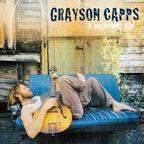 Grayson
Capps
Grayson
Capps
If You Knew My Mind
Royal Potato Family CD
The son of a Baptist preacher, New Orleans-based 48 year-old Grayson Capps
was born in Opelika, Alabama and, while at Tulane University in 1990,
started a self-described “thrash-folk” band called the House
Levellers as well as a blues-rock combo called Stavin’ Chain—that
managed to issue one album before breaking up. In 2004, several of the
singer/songwriter’s Southern Gothic-styled songs appeared on the
soundtrack for the well-received film A Love Song For Bobby Long and the
following year saw the release of his first solo record. Released for
Record Store Day, this ten-year anniversary reissue of that album (originally
out on Hyena Records) also boasts three bonus tracks from the sessions—a
determinedly rustic version of “Keep Your Lamp Trimmed & Burning,”
an autobiographical confessional titled “Banjo Player” and
an alternate take of “Washboard Lisa”—that pulses along
with fetching background harmonies by Capps’ wife Trina Shoemaker
and Tommy MacLuckie. Further remarkables begin with the episodic “A
Love Song For Bobby Long,” a barstool blues called “Slidell,”
the ruminative “Lorraine’s Song” (another soundtrack
song), a greasily bittersweet “Buckshot” and the intimately
visionary “I See You.” As Grayson puts it: “I write
songs which have the voice of dead prophets masquerading as town drunks
screaming “look at us—we’re pretty too.” Worth
searching out.—Gary von Tersch
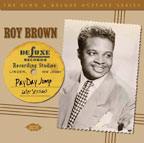
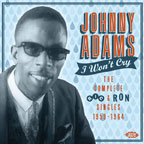 Roy
Brown
Roy
Brown
Pay Day Jump
Ace CD 1423 www.acerecords.co
Johnny Adams
I Won’t Cry
Ace CD 1424 www.acerecords.com
Two CD’s by two Crescent City legends. Before Fats Domino replaced
him in 1955, ex-boxer, emotive vocalist and high-caliber songwriter Roy
Brown was New Orleans’ first R&B superstar and while his time
at the top was relatively brief, his undeniable influence on the music
that followed will never be in doubt as long as compilations like Pay
Day Jump and its Ace label predecessor Good Rockin’ Brown are around.
This 24 track (eight previously unissued), acetate-sourced extravaganza
collects his later DeLuxe recordings, picking up where Good Rockin’
left off, with hot titles like “Boogie At Midnight,” the two-part,
large slice of double entendre titled “Butcher Pete,” a powerful
“Judgement Day Blues,” the ribald pair of “Miss Fanny
Brown” and “Fanny Brown’s Wedding Day” along with
the desperate expository “Hard Luck Blues”—that climbed
to #1 in mid-summer 1950 before being dislodged by Nat King Cole’s
plaintive ballad “Mona Lisa” in September. The downbeat tale,
however, struck a chord and proved to be Brown’s biggest and longest
charting (18 weeks) hit. I’ll leave the remaining uniformly rewarding
eighteen selections for the curious to discover—informative liners
author leads the way. New Orleans native and former gospel singer (with
a multi-octave range) Johnny Adams, on the other hand, is represented
by master takes of the A and B sides of all eleven of his soulfully righteous,
octave-spanning Ric and Ron singles—the Tan Canary’s very
first recordings cut between 1958 and 1964. One of the songs, “I
Won’t Cry” was only a regional hit but jump-started a career
that spanned more than three decades and included early jukebox favorites
like “Come On,” “A Losing Battle”(a national R&B
smash), “The Bells Are Ringing,” a swampy cover of Hank Williams’
“Cold Cold Heart,” the Mac Rebennack-composed “Showdown”
and “You Can Make It If You Try.” Adams later had releases
on Watch, SSS International, Atlantic and Hep Me before settling in at
Rounder Records—where he recorded nine albums in 15 years at the
tail-end of his career. But this is where it all began.—Gary von
Tersch
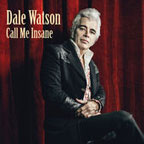 Dale
Watson
Dale
Watson
Call Me Insane
Red House CD 287
www.redhouserecords.com
Austin, Texas’ King of Honky Tonk was born in Birmingham, Alabama
in 1962, grew up in poverty in Pasadena, Texas and was musically inclined
as a youngster—as a teenager he was going to school in the daytime
and performing in local Houston clubs, dance halls and roadhouses at night—carrying
on the throwback tradition of Johnny Cash, Buck Owens and Willie Nelson
with his developing, multi-faceted (western swing, honky tonk, rockabilly
and outlaw) and bedrock-rich “Ameripolitan” brand of American
roots music. Watson’s third project for Red House links him and
his Telecaster up with his top-notch touring combo, the Lone Stars—pedal
steel guitarist Don Pawlak, percussionist Mike Bernal and upright bassist
Chris Crepps—along with producer Lloyd Maines on acoustic guitar,
pianist Danny Levin and the three-piece Honky Tonk Horns on 13 old-school
Watson originals along with a great version of Tony Joe White’s
“Mamas Don’t Let Your Cowboys Grow Up To Be Babies.”
Other gems include “Jonesin’ For Jones” (a humorous
nod to the legendary George Jones), the pensive title track, the fingers-crossed
“Heaven’s Gonna Have A Honky Tonk,” the histrionic “Crocodile
Tears,” a reflective “Everybody’s Somebody In Luchenbach,
Texas” and the memory-laden “I Owe It All To You.” Dubbed
“the silver pompadoured, baritone beltin’, Lone Star beer
drinkin’, honky tonk hellraiser” by the local Austin Chronicle,
Watson recently sat in with Jimmy Kimmel’s house band on Jimmy Kimmel
Live from SXSW and also emceed the inaugural SXSW “Ameripolitan”
showcase featuring the down-to-earth American roots music he specializes
in—that tells honest stories about the extraordinary lives of ordinary
people with words woven through solid melodies that “invite you
to hear what the singer is saying while the rhythm moves your feet.”
—Gary von Tersch
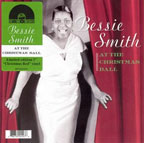
 Bessie
Smith
Bessie
Smith
At The Christmas Ball
Legacy Red Plastic 45
Miles Davis
Blue Xmas
Legacy Blue Plastic 45
The Animals
The Animals No. 2
ABKCO Extended Play 45
Herman”S Hermits
Blaze
ABKCO LP
Kenny Wayne Shepherd Band
A Little Something From The Road Vol. 1
Concord Extended Play LP
Saturday, April 18 was Record Store Day 2015, a celebration of the throwback
culture of the independently owned record emporium and your intrepid reviewer
hit the streets early to see what he could turn up as more and more mainstream
and independent record companies alike are issuing Limited Edition vinyl
discs for the occasion. Here’s some of the best that I turned up
as I traversed the San Francisco Bay Area. Nicknamed the Empress of the
Blues, Bessie Smith was the most celebrated female blues singer of the
1920s and 1930s and only had Louis Armstrong as a rival as a jazz vocalist—her
red plastic 45 features two of her classic numbers (“At The Christmas
Ball” and “Jazzbo Brown From Memphis Town”) with Fletcher
Henderson on piano. Jazz musician, trumpeter, bandleader and composer
Miles Davis was one of the most groundbreaking and influential musicians
of the 20th century and at the forefront of several major developments
in the jazz genre—including bebop, cool jazz, hard bop, jazz fusion
and modal jazz, His blue plastic 45 features him, along with the Gil Evans
Orchestra, on a pair of Bob Dorough compositions—”Blue Xmas”
and the footloose “Devil May Care.” Eric Burdon and his blues-based
early version of the Animals proffer their third British Extended Play
record (never released in the U.S.), with four R&B-oriented titles—”I’m
In Love Again,” “Bury My Body,” “I’m Mad
Again” and “She Said Yeah”—as a 10 inch record
for optimum audio fidelity. The vastly under-appreciated psych-pop gem
Blaze, the final studio album to contain all new material by Peter Noone
and his Hermits, was produced by the ill-fated genius Mickie Most and
has not been available in the U.S. in any format since its original release
in October 1967. Singer/songwriter and guitarist Kenny Wayne Shepherd
is a significant force in the worldwide resurgence of interest in the
blues, with the four live recordings collected here (“Looking Back,”
“House Is Rockin’,” “You Can’t Judge A Book
By The Cover” and a, count ‘em, seventeen minute medley version
of “Woke Up This Morning” and “You Done Lost Your Good
Thing Now”) culled from stops on his extensive 2014 tour—which
had him revisiting vintage blues numbers that initially ignited his love
of the blues and inspired him to pick up the guitar. His incisive interpretive
acumen and splendiferous guitar playing shine on songs popularized by
the likes of Johnny “Guitar” Watson, B.B. King, Bo Diddley
and Stevie Ray Vaughan. Long live vinyl!— Gary von Tersch
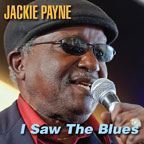 Jackie
Payne
Jackie
Payne
I Saw The Blues
Blue Dot CD 107 www.bluedotblues.com
An alum of the Johnny Otis band, soul singer Jackie Payne began singing
professionally as a teenager in Athens, Georgia and relocated to Houston,
Texas at seventeen where he recorded his breakthrough hit “Go Go
Train” for Huey Meaux’s Jetstream label. Its success caught
the ear of Stax Records and Payne was invited to tour with The Stax Revue
on a 45-city trek featuring Otis Redding (to whom his voice has often
been compared), Carla Thomas and Sam and Dave. What a way to jump-start
a career! But it was derailed for a while when he was drafted in 1968.
After his hitch he settled in Culver City, California—where he had
a steady gig at the fabled Cover Girl Club along with Pee Wee Crayton
until he joined the Johnny Otis Orchestra as lead singer. After fifteen
years with Otis, he moved to the San Francisco Bay Area and formed the
Jackie Payne and Steve Edmonson Band with the blues guitarist. Their Master
Of The Game disc on Delta Groove won the Contemporary Blues Music Award
for Best Soul Blues Album in 2006. In the spring of 2014, Payne finished
recording its follow-up I Saw The Blues and planned to release it later
in the year but in October he suffered a major stroke that has left him
unable to sing. Guitarists Kid Andersen and Anthony Paule stepped up to
oversee the mixing, mastering and manufacturing and the result is probably
his best yet. Accompanied by a greasy three-man horn section along with
a small combo fronted by Andersen and Paule, Payne is in great form throughout—whether
on his own inventive tunes (picks are an assertive “Doing My Own
Thing,” the autobiographical “I Saw The Blues” and the
downbeat, name-checking “Kicking Back With The Blues”) or
some well-chosen covers like the testifyingly funky, eight minute commentary
“I’ll Drink Your Bathwater Baby,” Tony Joe White’s
observational “I Get Off On It” and the pleading “Wife,
Woman, Hootchie.” I hear that Jackie is making a good recovery—hope
so. Buy the CD and say a prayer or two.—Gary von Tersch
Book
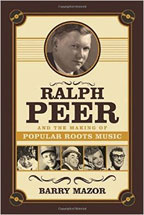 Ralph
Peer And The Making Of Popular Roots Music
Ralph
Peer And The Making Of Popular Roots Music
Barry Mazor
Chicago Review Press
Ralph Peer’s name will ring a bell with many readers of this journal
for reasons that are relentlessly scrutinized in this well-researched
book. Peer was born in Independence, Missouri to a lower middle class
family just before the turn of the twentieth century. Over the course
of the next thirty years, he would act as an advance guard for a variety
of overlooked genres and actively support musical groundbreakers for some
of the era’s foremost record companies—discovering and recording
heretofore unknown talent in big cities and modest towns alike. His energetic
work in bringing “hillbilly,” “race” and the music
of Mexico and the Caribbean to the public at large greased the skids for
the country, rhythm and blues, hip hop and Latin sounds as we know them
today. He also recorded (and sold) a lot of blues—from the classic
sort pioneered by Mamie Smith (Peer cut her first record, “Crazy
Blues,” that is generally considered as the first “blues”
release) to noteworthy blues guitar records by the likes of Sylvester
Weaver and Lonnie Johnson. As the market for blues quickly commercially
expanded, Peer “discovered” and recorded the likes of Blind
Willie McTell, Memphis Minnie, Tommy Johnson and Sleepy John Estes among
many others and also was instrumental in recording the early jazz sounds
of everyone from Louis Armstrong and Fats Waller to the orchestras of
Clarence Williams and Benny Moten. Big-eared Peer also worked his magic
in the early country idiom known as “hillbilly” with a big-selling
string of field recordings featuring the veteran Fiddlin’ John Carson
and also helped arrange and produce the legendary Bristol sessions that
launched the old-timey careers of both the Carter family and Jimmie Rodgers.
Farther on, in the mid-1950s, he played a large role in publishing Buddy
Holly’s songs. Mazor’s focus, throughout, is razor-sharp with
the record man’s adventurous saga told with economy, few sidetracks
and a lack of sensationalism. Overstatements, exaggerations or peripheral
details are also, refreshingly, absent—resulting in an extremely
readable, quite overwhelming biography that your reviewer found difficult
to put down. As no less an authority as Ry Cooder puts it: “Ralph
Peer is surely the most fascinating character in American vernacular music,
and I personally thank him, since I otherwise would have been sacking
groceries in El Segundo or parking cars in Pacoima all these years.”
A section in the appendix lists “Key Recordings and Published Songs
of Ralph Peer, 1920-1960” and the book has sixteen pages of period
photos.—Gary von Tersch
Home
/ Blues Blogs /
Artist Links / Blues
Links / Videos / Store
Subscribe / Advertise
/ Back Issues
/ Contact / Staff